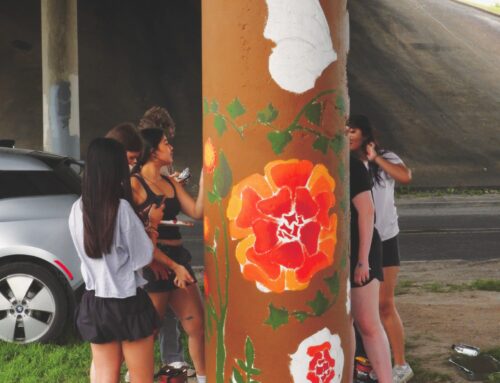He once ‘ate rejection for breakfast.’ Now this former advertising copywriter is drawing the attention of critics and Hollywood execs
To invite Will Clarke to your next book club, send him an e-mail at willclarke13@mac.com. There’s no fee; “just have really expensive cheeses,” he laughs.
Will Clarke reads The Worthy
Friday, Sept. 29, 7 p.m.
Writer’s Garret, 6115 La Vista
For information: 214-828-1715 or writersgarret.org
Will Clarke was fed up.
He’d spent months pounding away on his laptop keyboard while sipping lattes at Legal Grounds, only to have his novel rejected by publisher after publisher.
So Clarke decided to buck the system: He would write a book that was so far-fetched, so “trippy,” as he puts it, that no one would ever print it.
The result was Lord Vishnu’s Love Handles, the story of an off-kilter spy set in Clarke’s own stomping grounds, Lakewood. This time he took the self-publishing route (with the defiant title Middlefinger Press) and sold copies out of East Dallas shops and through amazon.com. At first, Vishnu was simply a neighborhood phenomenon, a topic of conversation at dinner parties and a favorite at book clubs. But Clarke soon began receiving e-mails from people as far away as Kosovo, New Delhi and Iran.
“If it had bloomed in Lakewood and never left the neighborhood, that would have been great,” Clarke says. “But it hit this kind of weird tipping point and spread all over the world, and it’s weird because that tipping point started in Lakewood.”
Before long, he received a call from a professor at George Washington University who wanted to use Vishnu in a freshmen literature class. Then he began hearing from a screenwriter in New Zealand who told him that big Hollywood names such as Brad Pitt and Wes Craven were reading his book — tales that seemed as outlandish to Clarke as the concept behind his novel.
By spring 2004, just two years after the novel debuted amid coffee grounds, the New York publishing house Simon and Schuster picked up Vishnu. The next week, Clarke turned around and sold The Worthy, his repeatedly rejected first novel that finally hit bookstores this summer.
“There’s a lot to that whole strike while the iron’s hot,” Clarke says.
With more than 20,000 worldwide sales of Vishnu and a recent cross-country promotional tour for Worthy under his belt, not to mention both novels optioned to become movies, it would seem as if Clarke has outgrown our neighborhood. But he doesn’t see it that way. On most mornings, you can still find him at Legal Grounds or across the street at Starbucks, chewing bagels and typing up a storm between conversations with the other regulars.
After all, the neighborhood coffee shop was the birthplace of Clarke’s writing career. Before he hit the big time, he was an advertising copywriter taking continuing education courses at SMU. From there, he formed a weekly writers’ group that began meeting at Legal Grounds in 1997, before gathering at a coffee shop a la Friends was trendy.
It was around that time that Clarke began writing Vishnu, drawing inspiration from the idiosyncrasies in his own life and those of his Lakewood neighbors. The book’s central character, Travis Anderson, lives on Lakewood Boulevard, plays golf at Lakewood Country Club, and tries to one-up his neighbors’ supper clubs (a jab directed just as much at Clarke’s own supper club membership as anyone else’s, he claims).
“There are a lot of overachievers here, and that’s just kind of funny to sometimes step back and look at how cranked up everybody is and the ridiculous things we do,” Clarke says.
Anderson is patterned after the typical East Dallas guy — except that he’s a spy who also happens to be an alcoholic. Taking this kind of harebrained protagonist and grounding him in a “nice, normal” place such as Lakewood is the kind of humorous juxtaposition that distinguishes Clarke’s writing.
He takes the same droll approach in Worthy with an even darker story: a fraternity pledge killed in a hazing incident whose ghost returns to haunt the house. But Clarke’s comedic styling shouldn’t be construed as an appeal for laughs; he made his books funny, he says, because he didn’t want to come off preachy.
The real premise of Vishnu? “Even at our worst, if we are called to do something good, most people can muscle up and do something to save the world,” Clarke says.
And Worthy? “It makes you think about your mortality and the decisions you make in your life and where they’ll lead you.”
Neighbors at the book clubs Clarke visits are quick to catch onto these deeper truths, he says.
“They get the metaphors. They’re looking for meaning and not just reading things just so they can get together and drink a bunch of wine and eat some cheese,” Clarke says. “I’ve been astonished at how intellectual the conversations are.”
Perhaps some of these loyal readers will cameo on the big screen when Vishnu is filmed. Producer Michael London, of Sideways renown, “totally gets the Dallas vibe and wants to shoot it all here,” Clarke says. He wrote the first draft of Worthy’s screenplay and says he’ll add his two cents to both projects when asked, but won’t be intimately involved. (And he swears that no head bashing or they-didn’t-stick-with-my-vision laments are forthcoming.)
“That’s why I write books — so I can be in control of my world,” Clarke says.
Opening this world to the masses on a self-financed venture was a bold move, especially after the onslaught of publishers’ form rejection letters. Luckily for Clarke, he “failed upward.”
“If you have too much to lose, you won’t risk it, and I got to the point where I didn’t have anything to lose,” he says. “It’s easier to just kind of put it aside and go on to something else, but as a writer, I eat rejection for breakfast — you just have to get used to it.”
Now he’s having to get used to glowing New York Times reviews and adoring fan mail. It still hasn’t sunk in.
“I’m just this guy who hangs out in a coffee shop typing on my computer and drinking too much coffee,” Clarke says. “This has exceeded my wildest dreams.”





